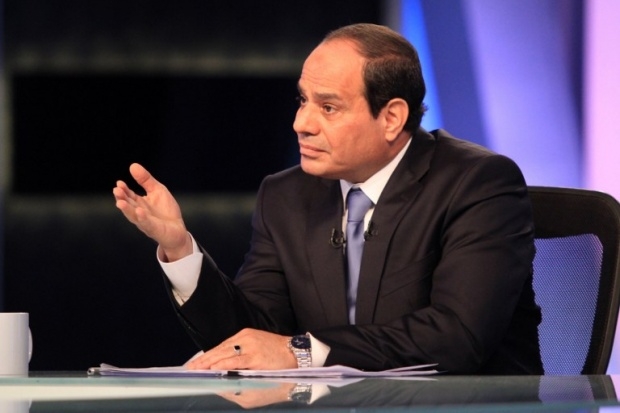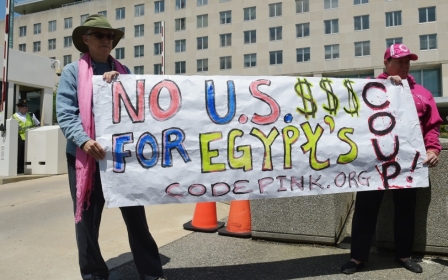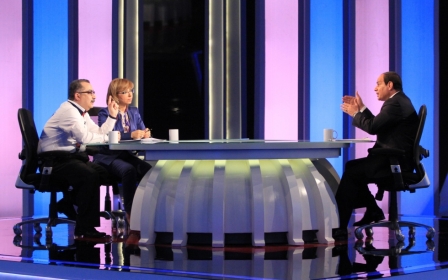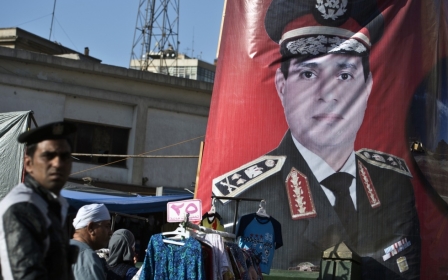Sisi: Egypt needs 25 years to become a democracy

Egyptian presidential frontrunner Abdel-Fattah al-Sisi believes it will take at least 25 years to achieve democracy in the Arab world's most populous country.
"Our problem is that we try to import well-established democracies in the West to our reality," Sisi said in an interview with chief editors of Egyptian newspapers on Wednesday.
He went on to predict that it would take Egypt between 20 to 25 years - or longer - to establish a functioning democracy.
"And that's provided that we have stability in the country," the former army chief said.
Sisi described the overthrow of former presidents Hosni Mubarak and Mohamed Morsi - in early 2011 and mid-2013 respectively - as "major steps toward democracy".
New MEE newsletter: Jerusalem Dispatch
Sign up to get the latest insights and analysis on Israel-Palestine, alongside Turkey Unpacked and other MEE newsletters
Sisi, who led Morsi's ouster by the military, is popular among Egyptians who supported the army's decision to unseat the Islamist president 10 months ago.
Egypt's Islamist opposition sees Sisi as the driving force behind the coup that unseated Morsi and the subsequent crackdown on members of the Muslim Brotherhood.
The former army chief is widely expected to win Egypt's upcoming presidential election, slated for 26-27 May.
Sisi also said that he would relinquish office if Egyptians took to the streets to demand he step down as president.
"I will do this because I am not running [in the election] out of a desire for power," he said. "I was asked by the people [to lead the country] because the homeland is under threat."
Patience on the economy
A day earlier in a major television interview, Sisi warned Egyptians that they will have to be patient and work hard to salvage their economy after three years of unrest.
The retired field marshal said foreign debt and subsidies costs ate away much of the budget, he said, while ruling out drastic subsidy cuts.
"I don't sleep, and neither will you," he said in the second part of an interview aired by two private television channels.
"You have a country that is being lost, a nation that is threatened," he said of the economy. "How do you talk to me about protest. I say: people beware, we have something that is being lost."
"What will be given to Egypt is important and could be a lot," he said when asked if more aid would come.
Sisi discussed his economic programme, promising to speed up projects while urging Egyptians to conserve energy use amid widespread power cuts.
He also ruled out drastic cuts to food and energy subsidies, which he said cost the state 200 billion Egyptian pounds ($28.5 bln) a year.
"You can't finish subsidies at once, no one can endure that," he said, but when asked if the economic situation would improve in two years he said: "Yes".
Uncompromising
Ex-army chief Abdel Fattah al-Sisi was uncompromising in his first television interview since announcing his run for Egypt's presidency, insisting the Islamist movement of the elected leader he ousted was "finished".
The Brotherhood was Egypt's best-organised political force for decades even though it has been banned for most of the time since its foundation in 1928.
But challenged whether he meant the Brotherhood would no longer exist under his presidency, Sisi answered: "Yes," rejecting any idea it might have a place in the political future.
James Dorsey, Middle East Expert with Singapore-based S. Rajaratinam School of International Studies, said "he has taken a hardline position by ruling out any possible reconciliation with the Muslim Brotherhood.
"Obviously he catered to his power base which supports him... there is no doubt that he is extremely popular among a large section of the population."
Nearly all of the Brotherhood's top leaders are in custody, among thousands of Morsi supporters who have been put on trial, resulting in hundreds of summary death sentences that have drawn international criticism.
Crackdown on secular dissent
But Sisi was unrepentant about the crackdown and the tight restrictions on protests that have angered some of the key leaders of the Arab Spring uprising that toppled veteran president Hosni Mubarak in 2011.
Last month, an Egyptian court even banned the April 6 youth movement, which had spearheaded the revolt.
And Sisi's only rival for the presidency, veteran leftist leader Hamdeen Sabbahi, has raised concern that Egypt is returning to the autocratic practices of the Mubarak era.
But Sisi insisted a controversial law adopted in November by the interim government he installed had been vital in restoring stability.
"We won't be able to meet challenges in Egypt today amid this state of chaos... and one of the tools to (tackle this chaos) was the protest law," Sisi said.
"He [Sisi] wants to consolidate his supporters and not win opponents," said Nevine Massaad, political science professor at Cairo University.
"He is saying 'you accept me as I am or don't'. He will not win over any of his opponents by making it clear he would do anything to achieve security," she said.
As the government Sisi installed has cracked down on persistent protests by Morsi's supporters resulting in clashes in which Amnesty International says more than 1,400 people have been killed, attacks by militants, some inspired by Al-Qaeda, have multiplied.
Cairo University politics professor Mustapha Kamel Al-Sayyid said: "What we saw yesterday was a firm leader who knows what he wants and who will work very hard to get what he wants.
"All the policies that were adopted since 3 July will continue. Nothing will change. He did not give an impression that he is a people's man."
Middle East Eye delivers independent and unrivalled coverage and analysis of the Middle East, North Africa and beyond. To learn more about republishing this content and the associated fees, please fill out this form. More about MEE can be found here.




